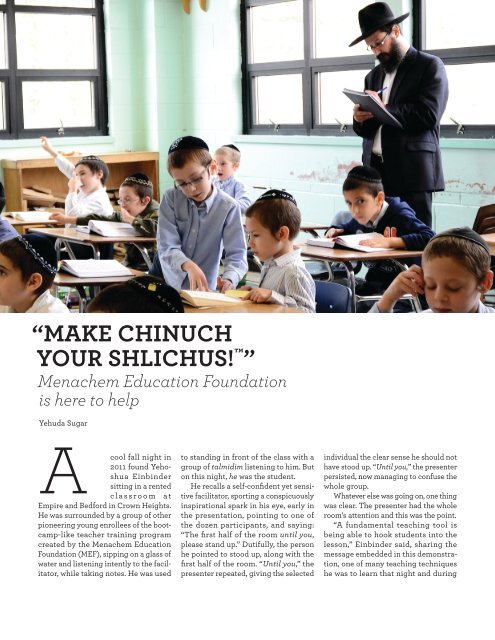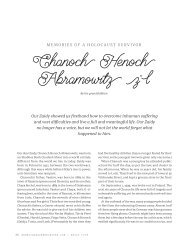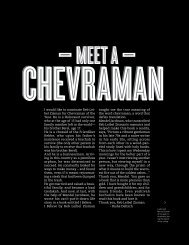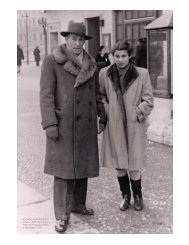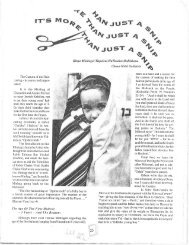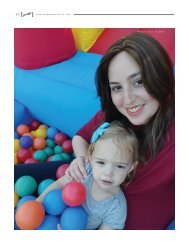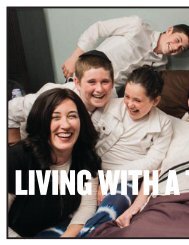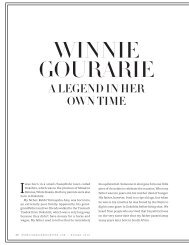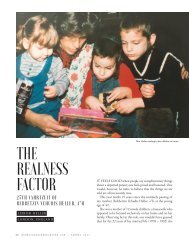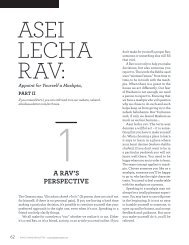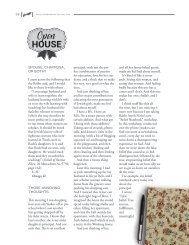Make Chinuch Your Shlichus
Make Chinuch Your Shlichus, Menachem Education Foundation is here to help, by Yehuda Sugar
Make Chinuch Your Shlichus, Menachem Education Foundation is here to help, by Yehuda Sugar
You also want an ePaper? Increase the reach of your titles
YUMPU automatically turns print PDFs into web optimized ePapers that Google loves.
71<br />
“<strong>Make</strong> <strong>Chinuch</strong><br />
<strong>Your</strong> <strong>Shlichus</strong>! ”<br />
Menachem Education Foundation<br />
is here to help<br />
Yehuda Sugar<br />
A<br />
cool fall night in<br />
2011 found Yehoshua<br />
Einbinder<br />
sitting in a rented<br />
classroom at<br />
Empire and Bedford in Crown Heights.<br />
He was surrounded by a group of other<br />
pioneering young enrollees of the bootcamp-like<br />
teacher training program<br />
created by the Menachem Education<br />
Foundation (MEF), sipping on a glass of<br />
water and listening intently to the facilitator,<br />
while taking notes. He was used<br />
to standing in front of the class with a<br />
group of talmidim listening to him. But<br />
on this night, he was the student.<br />
He recalls a self-confident yet sensitive<br />
facilitator, sporting a conspicuously<br />
inspirational spark in his eye, early in<br />
the presentation, pointing to one of<br />
the dozen participants, and saying:<br />
“The first half of the room until you,<br />
please stand up.” Dutifully, the person<br />
he pointed to stood up, along with the<br />
first half of the room. “Until you,” the<br />
presenter repeated, giving the selected<br />
individual the clear sense he should not<br />
have stood up. “Until you,” the presenter<br />
persisted, now managing to confuse the<br />
whole group.<br />
Whatever else was going on, one thing<br />
was clear. The presenter had the whole<br />
room’s attention and this was the point.<br />
“A fundamental teaching tool is<br />
being able to hook students into the<br />
lesson,” Einbinder said, sharing the<br />
message embedded in this demonstration,<br />
one of many teaching techniques<br />
he was to learn that night and during
72<br />
(Previous Page) Rabbi M. Greenbaum takes notes on a classroom<br />
observation.(Clockwise)(1) Educators and supporters saluted<br />
Mechanchim at MEF’s annual event.(2) Women’s Teachers Induction<br />
Program for women meets online from around the world.(3) At<br />
this summer’s Unlocking the Chumash workshop, Mrs. Sara Rosenfeld<br />
gave a crash course on Dikduk to eager educators.(4) Rabbi<br />
Y. Rosenblum presents the Zekelman Standards for Chumash at a<br />
workshop that took place both in Crown Heights and L.A.
73<br />
MEF’s ensuing year-long training program<br />
that he now uses daily to the<br />
benefit of all of his students.<br />
As it turns out, the ploy was more<br />
than an attention-getter.<br />
“Now that he had our attention, he<br />
explained to us that there is a discussion<br />
in Gemara Brachos which discusses<br />
what the Mishna means when a Tanna<br />
says ‘ad,’ meaning ‘until.’ Does it mean<br />
including or not including that number?<br />
Or in relation to chatzos, does it mean<br />
until and including chatzos, or until and<br />
not including chatzos?<br />
“This was the hook to get the<br />
attention of the class to introduce an<br />
upcoming concept in Gemara.”<br />
Before he would complete MEF’s<br />
intentionally out-of-the box program,<br />
Einbinder would be brimming with a<br />
host of new capabilities—from modern<br />
classroom management methods to<br />
sophisticated data-driven assessment<br />
routines, grade-specific learning benchmarks<br />
and tested remediation strategies<br />
tailored to the individual student.<br />
Most importantly, he said, he would<br />
learn how to build rapport with students<br />
—an area previously underemphasized in<br />
his teaching education—to the students’<br />
and their parents’ delight.<br />
In support of the individualized<br />
teaching emphasis, he said he learned<br />
about four learning styles (the VATK<br />
Inventory) and five ways of relating<br />
(Gary Chapman 1997) —borrowed from<br />
sources some may consider avante<br />
garde for the Chabad chinuch world, but<br />
that MEF believes fit right in with the<br />
Rebbe’s directives regarding hishtalmus<br />
hamorim, professional development for<br />
educators.<br />
Excited to share the information as<br />
if he learned it yesterday, Einbinder<br />
provided a bit more detail about ways<br />
to teach other than by looking into a<br />
sefer or at a paper: “Auditory types prefer<br />
to listen to lectures, visual types<br />
need to see something about what<br />
they are learning, let’s say a PowerPoint<br />
presentation with pictures. Kinesthetic<br />
types need to do something to absorb<br />
the information, like acting out a scene<br />
in the Chumash, and tactile types need<br />
to touch to learn.”<br />
Since taking the MEF journey, Einbinder<br />
went on to become a model<br />
teacher at Yeshiva Darchai Menachem in<br />
Crown Heights, where he was promoted<br />
post-MEF training from part-time assistant<br />
teacher to full-time assistant teacher<br />
to teacher of his own 5 th grade class.<br />
As for MEF, since that night, against<br />
a backdrop of a rising tide of ardent<br />
supporters along with some questions<br />
about its use of some non-traditional<br />
teaching theory and strategies, MEF<br />
has become an increasingly popular<br />
address for teacher training in the<br />
Lubavitch chinuch world. Its goal is<br />
to fully revamp schools’ educational<br />
approaches through its institutional<br />
consultation programs.<br />
What seems to be catching on is<br />
the organization’s dedication to providing<br />
both teacher and student with<br />
opportunities for unforgettable learning<br />
and teaching episodes, promotion<br />
of student-teacher relationship-building,<br />
well-defined learning goals, and<br />
rigorous data-driven assessment and<br />
remediation techniques. This is all<br />
in juxtaposition to what some might<br />
describe as the status quo—insufficiently<br />
inspired rote learning, devoid<br />
of proficiency milestones and sufficient<br />
assessment and remediation<br />
techniques, with students being fed the<br />
same material at the same pace regardless<br />
of capability and individuality.<br />
“Our end-goal is to create a rejuvenation<br />
of how we approach chinuch,”<br />
said MEF founder Rabbi Zalman<br />
Shneur, whose over-sized challenge<br />
builds on the work of his parents and<br />
grandparents who were all educators,<br />
including his maternal grandfather,<br />
Rabbi Leibel Kramer, appointed by the<br />
Frierdiker Rebbe to direct the Montreal<br />
educational system, and his paternal<br />
grandfather, beloved mechanech Rabbi<br />
Mordechai Shneur of Lod, Israel.<br />
“Education has to be a value-added<br />
proposition, where every day matters,”<br />
Rabbi Shneur said. “To make every day<br />
matter, we have to examine and see if<br />
we are accomplishing what is important<br />
and helping students reach their<br />
potential.”<br />
His mission includes putting chinuch<br />
more prominently on the map for<br />
aspiring Shluchim who often opt for the<br />
more alluring Chabad House <strong>Shlichus</strong>.<br />
The theme ranks high on the organization’s<br />
agenda as is made clear by<br />
its logo tagline: “<strong>Make</strong> <strong>Chinuch</strong> <strong>Your</strong><br />
<strong>Shlichus</strong>.”<br />
Shneur decided to go forward with<br />
his vision in 2008—incidentally while<br />
standing at the corner of President and<br />
Kingston, a block and half from the Rebbe’s<br />
house, while talking to a friend, who<br />
politely requested of him to stop talking<br />
about the idea and move forward.<br />
“I made the decision then and there,”<br />
Shneur said, “as it was clear to me that<br />
the future of Chabad was in bolstering<br />
chinuch.”<br />
Motivators also included sichos and<br />
numerous letters from the Rebbe calling<br />
on educators to be more accountable to<br />
the personal and learning needs of students,<br />
and a specific letter that could<br />
serve eerily as a personal directive for<br />
MEF’s work from the Frierdiker Rebbe:<br />
“Anyone who knows the field of<br />
chinuch and is seriously involved in<br />
guiding children recognizes and feels<br />
that even the most qualified and experienced<br />
educators need to speak with<br />
one another from time to time about<br />
the methods of education and guidance<br />
that are most suited to the type<br />
of students they are educating,” reads<br />
the letter, written in 1947 to the heads<br />
and melamdim of Central Yeshivas<br />
Tomchei Temimim Lubavitch and other<br />
Lubavitch schools. “And how much<br />
more so is it true that melamdim and<br />
teachers who are young and lacking
74<br />
experience are obligated to strive to<br />
expand their knowledge of education<br />
and guidance, and much of their success<br />
in this most responsible task, with<br />
Hashem’s help, depends on this.”<br />
Since MEF’s launching, the unassuming<br />
yet driven rabbi, who has a Dayan<br />
certificate alongside his smichah, has<br />
been busy recruiting new school clients,<br />
including some of the biggest in<br />
the Lubavitch system (Oholei Torah<br />
in Crown Heights and Cheder Menachem<br />
of Los Angeles, to name just two),<br />
raising money for the cause and surrounding<br />
himself with a dedicated staff<br />
to see his mission through from MEF’s<br />
offices on the corner of Kingston and<br />
Montgomery.<br />
He stresses that he could not have<br />
accomplished what he has without the<br />
support and counsel of seasoned and<br />
dedicated Chabad chinuch leadership<br />
figures such as Rabbi Yossi Rosenblum,<br />
principal of the Yeshiva Schools of Pittsburgh,<br />
whose forward-looking ideas<br />
were a clear match for the MEF mission.<br />
“For Jewish education to be successful,”<br />
Rabbi Rosenblum writes in a<br />
handbook prepared for MEF’s Zekelman<br />
Standards for Chumash and Talmud,<br />
“educators need to begin with the end<br />
in mind. Day schools need to assess not<br />
the presence of teachers teaching, but of<br />
students learning. This is a major paradigm<br />
shift from the way many think<br />
about education.”<br />
Between a new online women’s version<br />
of the teacher training program that<br />
has trainees logging in from both sides of<br />
the Atlantic and the men’s onsite summer<br />
and year-long programs, 125 teachers<br />
have experienced MEF’s training<br />
to date. The men’s program consists of<br />
an initial two-week summer immersion,<br />
followed by monthly follow-up forums<br />
and in-school mentoring sessions at a<br />
subsidized cost of $2,000. The women’s<br />
program meets bi-weekly throughout<br />
the year in live interactive virtual classrooms.<br />
The program is called the Teacher<br />
Induction Program (TIP), as teachers<br />
must be within their first three years of<br />
chinuch to qualify. An additional program<br />
to coach and train management-level<br />
educators is also offered.<br />
Current women’s program participant<br />
Mrs. Yael Rosenberger compared<br />
the training to “getting a college degree<br />
in teaching in Jewish schools with all of<br />
the chassidishe values in place.”<br />
She is particularly taken with<br />
the Zekelman Standards, the set of<br />
grade-specific learning milestones for<br />
Chumash and Talmud at the core of<br />
MEF’s offerings that were devised by<br />
Rabbi Rosenblum and a global committee<br />
of other educators, and funded<br />
by Alan Zekelman, a staunch MEF supporter<br />
and businessman from West<br />
Bloomfield, MI.<br />
Referring to the boost in her classroom<br />
capabilities provided by the<br />
Zekelman Chumash Standards, Mrs.<br />
Rosenberger, originally a pre-school<br />
and early elementary teacher recruited<br />
recently to teach 7 th and 8 th graders,<br />
said: “I really love Chumash and Chassidus,<br />
but I had not tried to teach them<br />
before. I had no idea where to begin. I<br />
now have learned how to present the<br />
information so they can really learn it<br />
and retain it.”<br />
The nitty gritty of the Zekelman<br />
Standards are that they provide Chumash<br />
and Talmud grade-specific<br />
learning goals in each of several areas,<br />
including vocabulary and language,<br />
content and comprehension, and Rashi<br />
and other meforshim for grades 1-8.<br />
Together with a rather technicalsounding<br />
tool, Data Driven Instruction,<br />
also borrowed from cutting-edge mainstream<br />
methodologies like some of<br />
MEF’s soft-skill teachings, the two provide<br />
the goals and benchmarks for what<br />
is expected to be learned in each grade<br />
and ways of assessing and fixing progress<br />
problems.<br />
The system also solves another<br />
perennial problem for teachers and<br />
schools: The tendency for overlapping<br />
or omitting of material between<br />
each grade for lack of clear yearly milestones.<br />
Though very technical, teacher<br />
trainees learn each of the methodologies<br />
throughout the yearlong program.<br />
They can also be bought by schools for<br />
a price or a partnering option, requiring<br />
schools to share with MEF newly<br />
added innovations and results from the<br />
use of the tools.<br />
Rabbi Rosenblum received support<br />
in the development of the Zekelman<br />
Standards from a team of educators<br />
representing chinuch from around the<br />
world, including Rabbi Mendy Greenbaum,<br />
principal of Cheder Menachem<br />
in Los Angeles; Rabbi Meir Perelstein,<br />
Director of Curriculum, Yeshiva Darchai<br />
Menachem; and Mrs. Sara Rosenfeld,<br />
Director of Curriculum, Yeshiva Beth<br />
Rivkah Colleges in Melbourne. Rabbi<br />
Meir Fachler, of Gemara Berura, an<br />
organization pioneering innovations<br />
in teaching Gemara, was instrumental<br />
in partnering with MEF to create the<br />
Talmud Standards. Mrs. Chanah Rose,<br />
former Curriculum Director of the<br />
Shluchim Online School, was brought<br />
on board in the summer of 2013 to contribute<br />
to the Chumash standards, and<br />
also went on to direct the women’s<br />
online branch of the Teacher Induction<br />
Program.<br />
Another significant contributor to<br />
MEF’s overall success is Rabbi Zelig Silber,<br />
the dynamic and knowledgeable<br />
facilitator of the men’s teacher training<br />
programs, and star of Rabbi Einbinder’s<br />
MEF experience, who holds a master’s<br />
degree in education and is 5 th and 6 th<br />
grade teacher at Monsey Cheder.<br />
In sharing a trove of educational concepts<br />
and hands-on techniques, Rabbi<br />
Silber landed on a favorite theme: The<br />
dispelling of the notion that a teacher<br />
has to wrestle with students to control<br />
or change their behavior.<br />
To drive the point home, he said he<br />
shares with teacher trainees a fictional
75<br />
conversation of a carpenter who quit his<br />
job to be a teacher and a teacher who<br />
quit his job to be a carpenter. The carpenter,<br />
when asked by the teacher why<br />
he left teaching, replies: “The boards<br />
of wood don’t fight back.” The teacher<br />
responds when asked why he became<br />
a teacher: “The boards of wood can’t<br />
change themselves into a new product,<br />
but with the proper direction, children<br />
can.”<br />
“That’s the major lesson they walk<br />
away with,” Silber said about one of the<br />
biggest gifts he believes MEF leaves<br />
teachers with. “It’s not about fighting<br />
the children. It’s about channeling their<br />
energies so they can be developed into<br />
a finished product.”<br />
That message, according to the<br />
feedback MEF receives regularly from<br />
parents and school officials, is clearly<br />
making it past Silber’s teacher trainees<br />
to their students. In a video recognizing<br />
Rabbi Einbinder’s receipt of this<br />
year’s Eisenberg Award for excellence in<br />
education from MEF, a parent of one of<br />
Einbinder’s students read a stirring letter<br />
of thanks he had sent to the teacher<br />
earlier in the year:<br />
“I have to tell you that aside from the<br />
actual learning that he is doing, B”H, so<br />
well, I was thoroughly impressed more<br />
than that with the derech halimud and<br />
the fundamentals being taught to him<br />
right now. These are things that were<br />
not taught to me when I was in yeshiva<br />
and the more I see it now, the more I<br />
see how essential it is<br />
for any student to learn<br />
this way in the future.<br />
“Please keep up the good work. I<br />
want you to know that he is picking up<br />
a tremendous amount of learning and<br />
he even seems to be enjoying the learning,<br />
B”H.”<br />
Silber says the increased joy and<br />
increased learning— referred to in the<br />
letter—go together, as MEF trainees<br />
learn in one of the key “aha” moments<br />
of the course: That an engaged, happy<br />
student is a better learner.<br />
To the enlightenment of all, the<br />
teachers are drilled on the theme that<br />
they must engage their charges on all<br />
human levels—the intellectual, emotional<br />
and physical—to perform their<br />
jobs properly, Silber said.<br />
”Without that, learning cannot really<br />
take place.” ■<br />
בס״ד<br />
VISION FOR CHABAD SCHOOLS<br />
Dear Students,<br />
As your teacher, I will strive each day to help you:<br />
Can we do a good job as educators without<br />
a clear vision of what we should be<br />
doing? Through intensive discussion with<br />
educators and mashpiim, MEF was able to<br />
come up with 7 things that every Chabad<br />
educator should take responsibility for.<br />
We would love to hear what you are doing<br />
to bring this vision to fruition! To share<br />
feedback and request more copies, email<br />
us at corp@mymef.org.<br />
1. Grow in your YIDDISHKEIT.<br />
.ה׳ in בטחון and אמונה 2. Have<br />
.חסיד 3. Be a true<br />
.תורה 4. Learn how to learn<br />
5. Gain SKILLS for life.<br />
.אהבת ישרא-ל 6. Be a MENTSCH with<br />
7. Be the BEST YOU CAN BE, in your own way.


